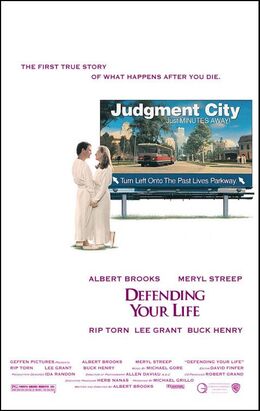
Depending on who you ask, there are many thoughts and opinions on what happens after you die. Some people maintain that we fade away into nothingness, whilst others cling firmly to the hope that they will enter eternal life with God, in Heaven. Writer/director Albert Brooks, however, seemingly isn’t a fan of those views, as suggested by the tagline for his film Defending Your Life: “The first true story of what happens after you die.” In this, his ‘New Age’ comedy, Brooks vividly imagines what life after death might be like, offering a visually fresh perspective that simultaneously draws comparisons to purgatory, whilst also touching upon the idea of reincarnation.
The result is a charming mix of romance, comedy, and fantasy – one that entertains, but also prompts us to ask, ‘What will eternity look like?’. Thankfully, the Bible offers not only the answer to this age-old question but points us to the One for whom we can – with certainty – enjoy spending eternity in the presence of: our Creator, God.
On the day of his 39th birthday, upon which he gifts himself a plush, new BMW, advertising executive Daniel Miller (Brooks) is tragically – if amusingly – killed in a car accident. Moments later he’s welcomed into Judgement City – a utopic ‘holding place’ for the deceased, where it’s always 74 degrees & sunny and all-you-can-eat buffets never affect your waistline. Whilst it initially sounds heavenly, Daniel is soon troubled to learn that this isn’t Heaven, nor is it Hell. He’s in Judgement City, an eternal destination where deceased people are put on trial, before two judges. Expecting to learn that he’s on trial for his various wrongdoings, Daniel learns that he will instead be judged on whether he allowed fear to negatively impact his life. The outcome will then determine whether Daniel will move forward to become a ‘citizen of the universe’ or return to earth in a reincarnated form to try again. To defend his life, Daniel is introduced to one Bob Diamond (Rip Torn), his defence attorney, but also crosses paths with the beautiful Julia (Meryl Streep) – a seemingly fearless woman who might be able to teach Daniel a thing or two about what it means to be courageous.
Spending time with Daniel in Judgement City is, admittedly, a joy. We see him react to discovering that his total brain usage was somewhere in the 3-5 percent range (Bob condescendingly explains that this is perfectly normal), and view clips of his ‘past lives’ in the Past Lives Pavilion, that both bemuse and startle him. Is this what eternity holds for us, according to the Bible? Are we to spend a portion of our eternal existence constantly being poked fun at, as we prepare to return to earth to ‘try again’, or simply watch our past selves fail, over and over? Thankfully, no. In Hebrews 9:27 we read that “each person is destined to die once and after that comes judgment.” From a biblical standpoint then, it’s very clear – all humans are destined to live one life that will someday end, and then we’ll meet God face-to-face, to determine whether we’ll spend eternity in His presence. If it all sounds quite serious, that’s because it is. But at least in eternity, we (thankfully) won’t need to be judged over the course of a week-long hearing before two judges, who’ll need to listen to a prosecutor and a defence lawyer, before determining if we’ve been ‘good enough’ to be rewarded in eternity. No, God has already seen and knows what our lives will have consisted of – for as the Psalmist once said, “You see me, whether I am working or resting; you know all my actions. Even before I speak, you already know what I will say” (Psalm 139:3-4, GNT). The question is, however, what will he say to us at the end of our lives? If “it is to him that we must…give an account of ourselves” (Hebrews 4:13, GNT), will He welcome us into His Kingdom, such as we are?
Writing on the idea of Defending Your Life and the subject of being ‘judged’, Albert Brooks once said the following: “Imagine if you had to sit in a courtroom and watch your life. I don’t care who you are, if you committed a crime and you had to have all…your emails searched and made public, who on this planet could survive that? Nobody.” Here, Brooks taps into the difficult reality for everyone who will stand before God in eternity, with their life laid bare before him – warts and all. We’re told that the “Lord sees every heart and knows every plan and thought” (1 Chronicles 28:9, NLT), and He has watched humanity rebel against Him since Adam and Eve were cast out of the Garden of Eden. According to His Word, “everyone has sinned” and “fall(en) short of God’s glorious standard” for living (Romans 3:23, NLT). This means that each of us have had impure thoughts, spoken insulting words, and committed physical wrongdoing with our own bare hands. And it’s because of all that, God demands a rightful payment (or restitution) must be made for our mistakes; that payment is eternal death & separation from the God who made us (Romans 6:23). If we return to Brooks’ comments about ‘surviving judgement’ from a Christian perspective then, we couldn’t possibly survive God’s passing of judgement upon us – we wouldn’t have a leg to stand on. All we could do is admit our sin before Him, just as King David once did: “Against you, and you alone, have I sinned; I have done what is evil in your sight. You will be proved right in what you say, and your judgement against me is just.” (Psalm 51:4, NLT). So then, what hope is there for us?
Though “your sins (and mine) are like scarlet”, God can and promises to “make them as white as snow” (Isaiah 1:18, NLT). He can remove the stain of sin upon our souls when we accept God’s grace, ask for His forgiveness, and receive the gift of His salvation, which was made possible through the atoning sacrifice of Jesus Christ on the cross. It is only through Jesus’ sacrifice, for all humanity, that we may be cleansed, redeemed, and thereby made fit for Heaven. The wonderful promise is that if anyone has “washed their robes with the blood of the Lamb”, they will be declared by God to have been made “clean and white” (Revelation 7:14, ICB) before Him, and can enter Heaven. We don’t have to worry about coming before a court, and being made to defend ourselves, or ever concern ourselves with ‘trying life again’. No, we can know that we’ll be united with God in Heaven, after we die, if we’ve put our hope and trust in Jesus: “we confess our sins to him, he is faithful and just to forgive us our sins and to cleanse us from all wickedness” (1 John 1:1-9, NLT). And how wonderful it is to know that this holy city will be unlike anything we’ve ever experienced – it’s without anything to compare it to, “no one has ever imagined what God has prepared for those who love Him” (1 Corinthians 2:9, ICB). So, whilst I’m thankful for Mr. Brooks’ humorous look at the afterlife, I give praise to God that it will never be as this man sees it! For unlike in this film, there will be no more tears, pain, sorrow, or separation – death itself has been conquered, and we will “see Him (God) as He really is" (Revelation 21:4, 20:6, 1 John 3:2 – ICB). There’s no need to defend our life, but there is a need for it to be saved – and how wonderful salvation is, both now and in eternity.
Challenge:
Why not prayerfully invite a friend or family member who doesn’t yet know Jesus, to watch Defending Your Life for themselves? Use the film’s themes to ask them what they thought of the film, if they spotted any links to Christianity and what they might think of the Gospel’s response to this subject.
If you feel able to, why not start a conversation with them and use the following questions?
1. What do you believe will happen after you die? After discussing this question between yourselves, take some time to explain (from a biblical perspective) that one’s eternal destination depends upon whether a person is found in Christ, and Christ lives in them. For example, we’re told by Jesus in John 3:18 (NLT) that “there is no judgment against anyone who believes in Him”, who is God’s Son. Later, this truth is reinforced when John the Baptist says, “He who believes in the Son has eternal life” John 3:36 (ICB). However, those who do not receive Jesus Christ as Saviour, will be separated from Him in eternity, experiencing eternal punishment. These people, the Word tells us, will be “thrown into outer darkness, where there will be weeping and gnashing of teeth.” (Matthew 8:12, NLT). But, praise God, if “you openly declare that Jesus is Lord and believe in your heart that God raised him from the dead, you will be saved” (Romans 10:9, NLT). So, what’s stopping you from declaring Jesus as your Saviour, today?
2. Throughout the film, the subject of being ‘good enough’ to move on into the next stage of eternity, arises frequently. Do you feel that you would be accepted into the Kingdom of Heaven, as you are now? Why or why not? Go on to explain that unlike the viewpoint presented in the film, being welcomed into God’s presence isn’t about being ‘good enough’ – simply because nobody has done enough ‘good’ to enter the presence of God. No, we will be judged on what we did, didn’t and should have done, in line with God’s holy laws. What matters then, is that we’re redeemed by God through the cleansing power of the Jesus. Read Romans 3:23-24 together – take a moment to explain the gift of God’s grace, and how He’s offering it to all who wish to receive Him, be changed by Him, and saved by Him, today.
Take the opportunity to share the hope of the Gospel message with them, encouraging them in the knowledge that by turning away from our sin and asking Jesus into our lives, we can step into life-giving, purpose-giving relationship with Him, that lasts for eternity. Why not offer them prayer, as well, if time allows?
Prior to watching the film for yourself, however, take a moment to pray that God would speak to you through the film. If you feel comfortable, pray this prayer over all your future, film-watching experiences:
Dear Lord, as I watch this film, I ask that you would be present here with me. Highlight to me anything within it that is honourable, anything that can be used in conversation for your Kingdom purposes. May I then use this film to speak of you to those who are lost and in great need of salvation. Amen.
Defending Your Life is currently available to rent through Amazon Prime Video (U.K.) & YouTube (U.K.).



 RSS Feed
RSS Feed